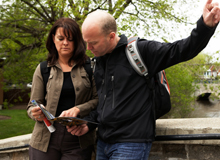FAQ
What is radiotherapy?
Radiotherapy is a treatment method for cancer and other diseases, based on the application of ionizing radiation. Such radiation treatment can be applied externally as well as internally.
How does radiation works?
Radiotherapy exerts its action damaging the cancerous cell’s ADN, thus preventing the reproduction and growth of such cells. Afterwards the cancerous cells die and the tumor become smaller.
Is the treatment painful per se?
No, radiotherapy treatments do not cause pain, is just like having a simple X-Ray procedure. However, even though radiotherapy is painless, it could produce some unwanted side effects. By instance, the skin where radiation is aimed may look like you got a sunburn, and thus some preventive measures may be in order.
Would I become radioactive?
External radiation does not make you radioactive and you will not represent a risk for any people around you. However, if you receive a Radioactive Implant some visitors, like pregnant women and small children, would not be allowed near you, and the time limit of your visits must be restricted until the implant is removed. Your physician or nurse will let you know if such measures are indeed required.
Are there any risks involved with radiotherapy?
The amounts of radiation necessary to damage or destroy cancer cells can also affect healthy tissues. If this happens you may experience some side effects. However, the risk of such events are usually overweighed by the benefits of the cancer cells’ death. The radiotherapist doctor will closely monitor any adverse reaction.
What should I do about the radiotherapy´s intrinsic risks?
All possible risks, problems or side effects that may emerge because of radiotherapy, are subjected to the type of treatment, dosage and the part of the body been treated; abdominal radiotherapy may produce diarrhea; head or neck irradiation could cause ulcers inside your mouth.
The more frequently reported side effects are fatigue and oral/skin lesions. Before the start of treatment, your doctor will advice you on some ways to avoid or minimize the most likely discomforts.
What are the typical side effects of radiotherapy?
The most frequently reported side effects of radiotherapy are fatigue and skin irritation at the treatment spot. Other side effects are dependant of the part of the body getting treated and the dosage been administered, for example:
- Dryness or lesions in the mouth and pharynx could occur when treatment is administered in the mouth, throat or neck regions.
- Some coughing or excessive production of mucus may be present if the area under treatment are the lungs.
- Nauseas or mild diarrhea may occur when treatment is been focus on the abdominal region.
Must of these side effects will go away by themselves in 4 to 6 weeks after the end of treatment. Some longer standing side effects could affect the skin, like color and elasticity changes around the treated area. Share any worries you may have, regarding any side effect, and ask your radiotherapy-oncologist about some drugs to counteract them before the beginning of your treatment.
Will radiotherapy make me sick?
Most of the patients will not even experience nausea associated with radiotherapy, unless the stomach is the region been treated. If you feel nausea or any other symptom, let your doctor know about it. There are effective drugs to reduce or avoid such discomforts.
Am I going to loose my hair?
No, you will not loose your hair unless the scalp is the region under treatment. Usually only the regions getting the radiotherapy will experience the hair loss. By instance: if the area been treated is one of your upper extremities you can expect to temporarily loose the arm’s bodyhair during treatment.
How long my radiation treatments will take?
Most of the times external radiotherapy treatment is administered in daily sessions for a period of 5 to 7 weeks. Patients generally will receive such treatments from Monday through Friday and get to rest all weekend long. On a daily session, you will stay inside the treatment room for about 15-30 minutes, although actual treatment time will last considerably less.
Who will apply my radiation treatments?
A radiotherapist is a physician specialized in radiotherapy. Your radiotherapist will decide on the type of treatment more appropriate for your condition and will calculate the correct quantity of radiation, while working closely with a team of other health professionals, to select the best way to get you such a treatment.
These professionals include:
- Radio-physicists. They are the experts making sure the machines are working appropriately and always releasing the exact doses of radiation.
- A Physicist will work closely with the Physicians in the planning of your treatment.
- Dose-metricist are specialists working with the Physician and the Physicist, to create the Treatment Plan and estimating the radiation dosage to be administered to a particular tumor but protecting the normal tissue surrounding it.
- Radiotherapy technicians are professionals in charge of handling and operating the machines that produce the radiation to be administered in your treatment using the Linear Accelerator.
- Radiotherapist’s nurses are professionals who facilitate coordination through their assistance, know how to handle side effects and can help you and your companion learn more about your treatment.
Can I bring someone over, to be there with me, during my treatment sessions?
Friends or family can join you on your treatment days. However, the radiological protection standards prohibits anyone, but a person carrying a personal dosimeter or the actual patient, to be present in the controlled area of radiation during the time the radiation equipment is being operated.
It is possible your companionship will be asked to remain in the reception area while you are been treated. This policy works also in the best interest of other patients’ privacy. Only patients and Hope’s staff are allowed to remain in the treatment area during your procedure’s schedule time.
Can I continue performing my normal routines/activities while my treatment sessions are not finished?
You should be able to continue with your normal routine. Most of the patients continue carrying through their normal activities full time, or performing their leisure activities, at the same time they are been treated.
Take time to rest as you need it; keep a healthy diet.
Would I be all by myself throughout my sessions?
Because the effects of radiation are cumulative and our radiotherapy technicians treat a lot of patients every month, it represents a long-term health risk for them if they would remain inside the treatment room throughout every radiation treatment sessions. To make sure you are fine and the administration of your treatment is going as planned, you will be able to verbally communicate with your radiotherapy technician at all times, and will remain under video surveillance permanently. In case you ever need help, you can simple speak aloud and the technicians will immediately pause your treatment in order to meet your needs.
What types of cancer can be treated with Brachytherapy?
Brachytherapy is essentially used to treat prostatic cancers in early stages; however, it can also be of benefit for, among others, breast, cervical, head and neck cancers.
What does a “seed implantation” in the prostate (Brachytherapy) involves?
For the majority of patients, the implantation of radioactive seeds constitutes a one-time low-impact procedure involving no surgery. The implantation of radioactive seeds in the prostate is performed typically under an ambulatory context, by a medical team composed by an urologist and a radiotherapist doctor with the assistance of a radiophysicist. It is usually done under spinal anesthesia but we also choose general anesthesia on rare occasions. This procedure is carried out inside a hospital´s operating room. And it can be practiced on ambulatory patients as well as on hospitalized ones. Most of the patients can return to normal activities, work included, after between one to three days, with little or no pain at all.
Will the radioactive seeding be painful?
After a radioactive seed implantation in the prostate, typically some pain under the scrotum will be felt. Occasionally, some patients describe it as “been seating on a golf ball”; this is due to a mild inflammation and bleeding associated with the surgery. It resolves gradually. Most of the patients only need analgesics like paracetamol (Tylenol®); very rarely stronger painkillers are needed.
After a radioactive seed implantation procedure in the prostate, when can I resume exercises and other strong activities?
The insertion of needles produces a given injury to the blood vessels surrounding the prostate. Therefore, immediately after implantation, any kind of exercise or activities with the potential to exert pressure over the prostate must be avoided. You shouldn’t pick up heavy objects either, or perform strong exercises, for at least three to four days after such procedure is performed. Strong exercises after that period may cause some kind of small bleeding inside the bladder. That by itself it´s not harmful, but further exercises should be avoided until bleeding stops. Activities with the potential to exert pressure over the prostate such as cycling, horseriding or the use of motorcycles should not be attempted for at least six months; repeated hits to the prostate caused by those activities may induce mild inflammation and could impair urination.
Would I become radioactive after a seed implantation procedure?
No, you will not. Although the seeds are indeed radioactive, patients never become so. Because radioactive is so low and precise, the prostate absorbs almost all of the radiation. Nevertheless, special measures must be taken, for the first two months after treatment, anytime a patient comes in contact with small children or pregnant women. Your nurse or physician will advise you regarding the kind of precautions needed and when to take’em.
Does seed implants’ radiation represents any kind of danger for my sexual partner?
No. Seeds have very low energy and represent a small risk for your partner. The semen itself do not become radioactive either. You can resume your sexual life very soon after the procedure is completed. On occasions, blood may show up on semen or a mild pain may be perceived along with your orgasms.
.png)

